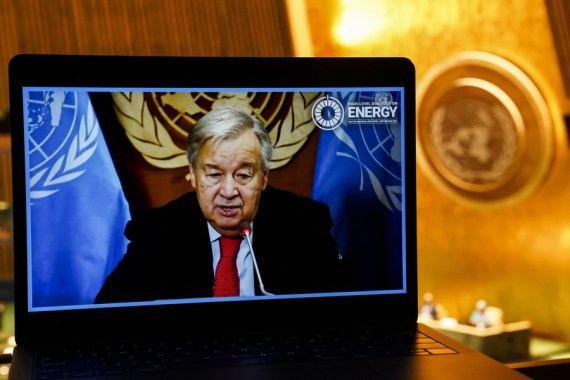UN dialogue on energy ends with solid commitments
Published : 26 Sep 2021, 03:54
The UN High-Level Dialogue on Energy, convened by Secretary-General Antonio Guterres, ended Friday with over 400 billion U.S. dollars to finance clean, affordable energy and carbon neutrality efforts committed by governments and the private sector.
Over 35 participants -- ranging from small island developing states to major emerging and industrialized economies -- made significant new-energy commitments in the form of Energy Compacts, reported Xinhua.
Additionally, several new partnership initiatives were announced, aiming to provide and improve access to reliable electricity to over a billion people.
The new commitments would result in large increases in the installed capacity of renewable energy and significant improvements in energy efficiency around the world, leading to hundreds of new renewable energy facilities and millions of new green jobs, the UN said in a press release.
The dialogue took place as world leaders grapple with the critical urgency to keep the 1.5 degrees temperature target of the Paris Agreement within reach, and cut emissions by 45 percent by 2030, while bridging the energy access gap and providing more than 1 billion people who currently rely on harmful fuels with clean cooking solutions.
The new commitments demonstrate the bold action needed to achieve Sustainable Development Goal 7 (SDG 7), the press release said.
Aside from the announcement of commitments, the dialogue also set out the timelines needed to achieve the SDG 7 target of net-zero emissions by 2050 in compliance with the Paris Agreement and a blueprint for action.
The roadmap is expected to call on governments, businesses and civil society organizations to close the energy access gap by 2030, and accelerate the clean energy transition by tripling investments in clean energy and energy efficiency by 2030.
It will also call for phasing out coal by 2030 for countries of the Organization for Economic Cooperation and Development and 2040 for all others, and shifting fossil fuel subsidies to renewable energy investments, while creating new decent and healthy jobs and ensuring a just, inclusive transition.
The roadmap draws on inputs from expert working groups and was discussed at ministerial-level forums in June.
More than 150 Energy Compacts from national and local governments, businesses, foundations and international, civil society and youth organizations were submitted for the dialogue, which reflect actions and finance commitments through 2030.
Presently, nearly 760 million people still lack access to electricity and some 2.6 billion people lack access to clean cooking solutions.
It is estimated that the cost of closing the energy access gap is about 35 billion dollars a year for electricity access and 25 billion dollars a year for clean cooking.
"The commitments coming through this process led by UN-Energy are a real signal of what is possible," said Guterres. "I am pleased to see several of the major emitters -- countries and sectors -- demonstrating leadership through the High-Level Dialogue process along with bold commitments to act."
"We must solve these challenges this decade. And we must start today. Without deep and rapid decarbonization of our energy systems over the next 10 years, we will not reach the Paris Agreement goal of limiting temperature rise to 1.5 degrees. This will be fatal to the Sustainable Development Goals," he said.
"So, we have a double imperative," the secretary-general said. "To end energy poverty and to limit climate change. And we have an answer that will fulfil both imperatives. Affordable, renewable and sustainable energy for all."
Guterres also called for closing the energy access gap by 2030. "That means cutting in half the number of people without access to electricity by reaching 500 million people by 2025. And it means providing over 1 billion people with access to clean cooking solutions by 2025," he said.
"If we are to recover from this pandemic and reignite socio-economic growth, then closing the energy divide is essential," said President of the 76th session of the United Nations General Assembly Abdulla Shahid at the dialogue.
He said he believes that energy is critical to both recovery from the global pandemic and efforts to tackle climate change.


